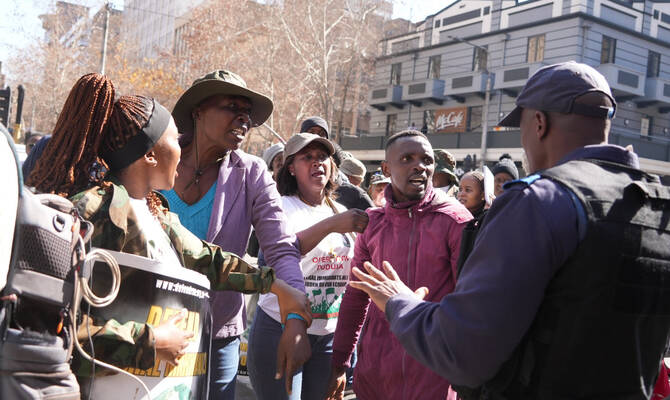A growing anti-migrant movement in South Africa is now blocking foreigners from receiving healthcare at public clinics. The group, known as Operation Dudula, has been stopping people at clinic entrances and demanding identity documents before allowing anyone inside. At the Diepsloot public health clinic in Johannesburg, members arrive as early as 6 a.m., wearing military-style uniforms and refusing access to migrants, including mothers with sick children. They tell foreigners to go to private hospitals, even though many cannot afford private care.
This trend has spread across Gauteng province, the most populated part of South Africa. Healthcare has now become the latest area where anger over immigration is playing out. Many clinics have seen confrontations between Operation Dudula members, migrants in need of treatment, and health workers who are trying to follow the law. A Johannesburg High Court has ordered the group to stop harassing migrants, but Operation Dudula has said it plans to appeal the ruling.
South Africa has long attracted migrants from Zimbabwe, Mozambique, Lesotho, Nigeria, and Ethiopia because it is one of the most developed countries on the continent. In the past year alone, the Department of Home Affairs deported nearly 47,000 people who entered the country without documents — an 18% rise from the previous year. Operation Dudula claims that undocumented migrants take jobs from local people at a time when unemployment is over 31%.
The group has been active for several years and has carried out other actions, such as shutting down shops owned by foreigners and blocking children of migrants from attending public schools. But its focus on denying people access to healthcare is new. Its structure has also become more organised, with regional leaders, press conferences, and even hints of turning into a political movement. The government has strongly condemned the group’s actions, insisting that the law grants healthcare access to everyone, even undocumented migrants.
Health Minister Aaron Motsoaledi has warned that healthcare workers cannot violate the law by turning patients away. While security officers have been deployed at some clinics, police resources are limited due to high crime levels. In August, three Operation Dudula members were arrested after they stormed a maternity ward in Soweto and demanded that pregnant women show identification. Nurses called the police, and the suspects were later released on bail.
Why is healthcare access becoming a target for anti-migrant groups in South Africa?
This is happening because many people blame foreigners for overcrowded clinics, medicine shortages, and pressure on public services, even though experts say the country’s healthcare system has long struggled with underfunding and poor management.
South Africa spends about $15 billion, or 8.5% of its GDP, on healthcare — one of the highest levels in Africa. Still, hospitals face overcrowding, limited medication, and deteriorating infrastructure. Human rights groups warn that migrants are being used as scapegoats for these deeper problems. The South African Human Rights Commission noted that rising anti-immigrant sentiment mirrors global trends seen in Europe and the United States.
Some migrants shared their painful experiences. Zimbabwean national Blessing Tizirai, who was pregnant, said she was turned away from clinics several times before moving to Musina, a border town where Operation Dudula does not operate. Another Zimbabwean woman, Nonhlanhla Moyo, said she was refused entry at the Diepsloot clinic and fears the consequences because she cannot get the asthma medication she needs. Both women said returning to Zimbabwe is not an option because public hospitals there have collapsed, forcing patients to bring their own medicines and supplies.
Operation Dudula’s actions have even sparked discussions in Zimbabwe’s Parliament. One lawmaker suggested that Zimbabwe should cover the costs of its citizens’ treatment in South Africa to ease tensions. However, the Justice Minister rejected the idea, despite many in Zimbabwe’s political elite seeking medical care abroad, including in South Africa.

